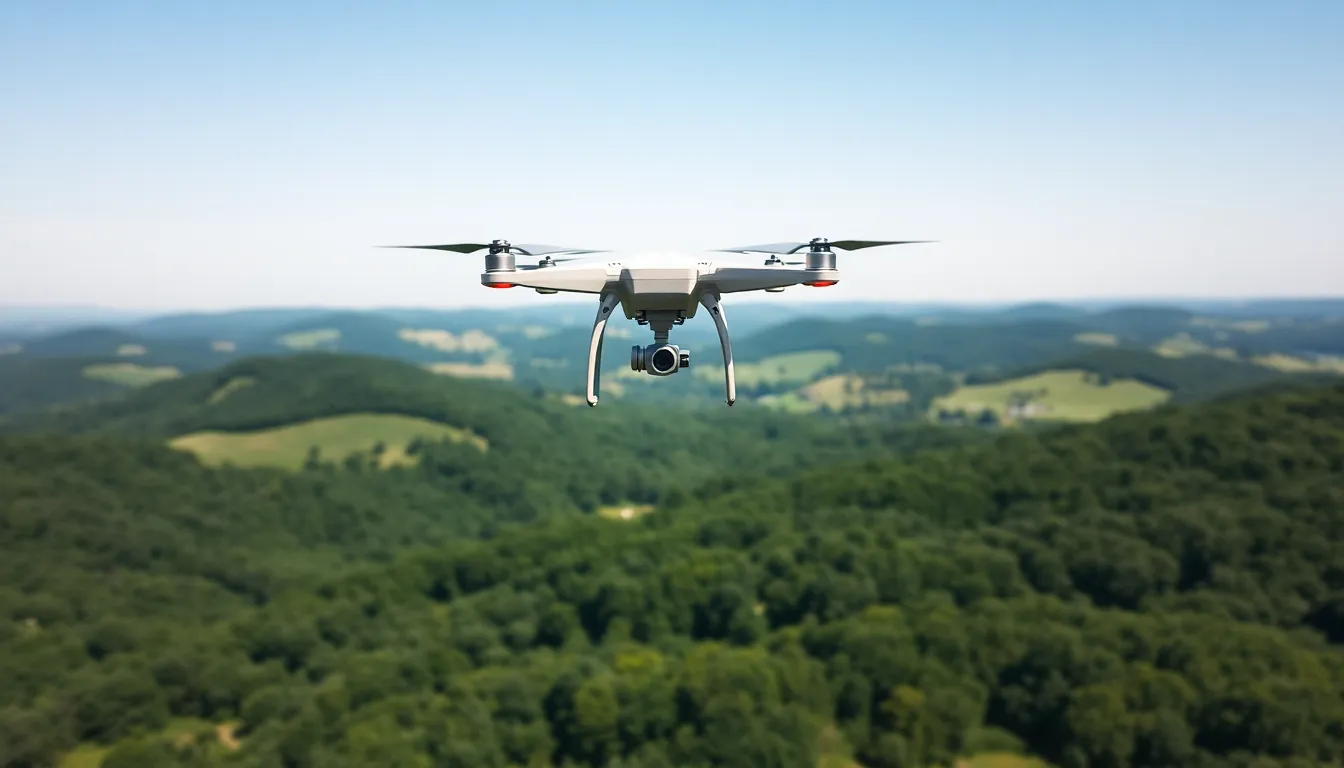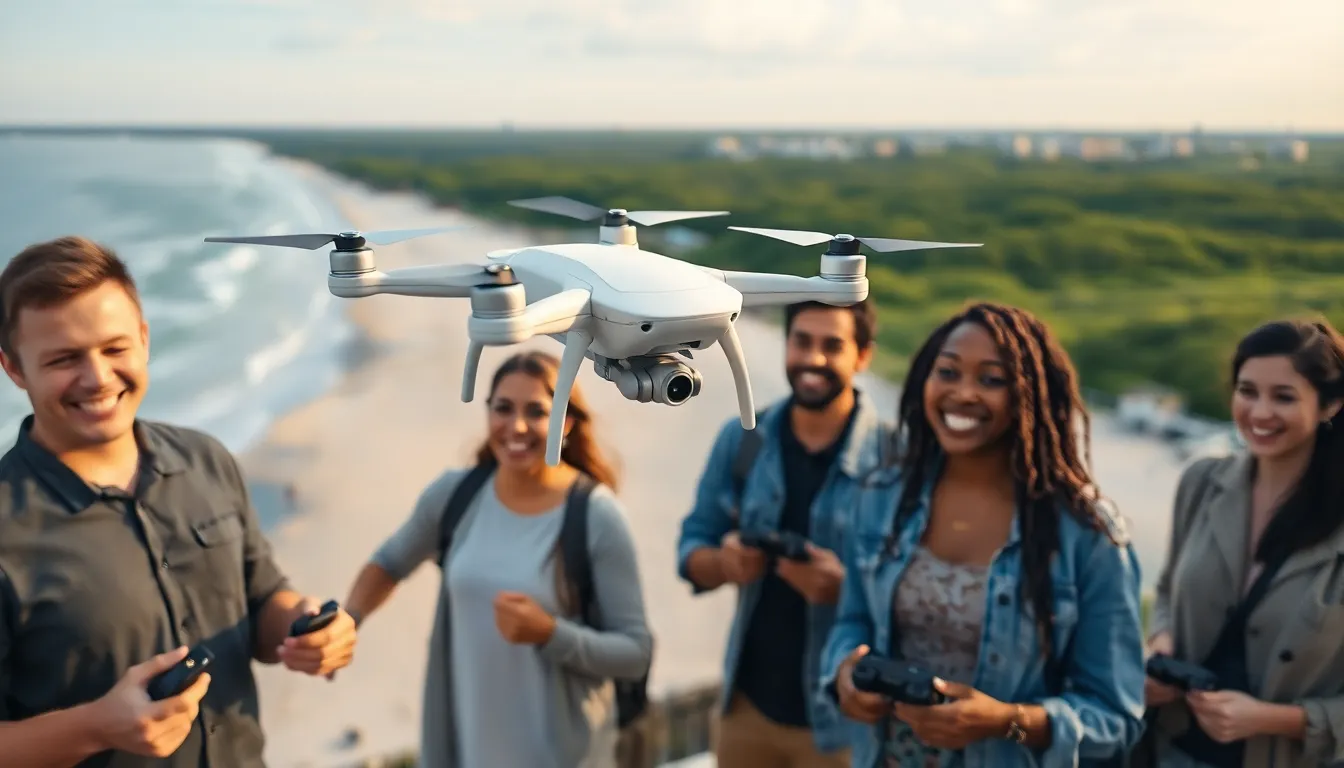In the Garden State, where the pizza is legendary and the traffic is a nightmare, drones are taking to the skies like never before. These flying gadgets aren’t just for tech enthusiasts or movie directors; they’re revolutionizing everything from real estate photography to agricultural monitoring. Imagine capturing the breathtaking beauty of the Jersey Shore or surveying sprawling vineyards—all without leaving the comfort of your couch.
Table of Contents
ToggleOverview of Drones Flying in New Jersey
Drones are making significant strides in New Jersey, with applications expanding across multiple sectors. Real estate agents utilize drones to create immersive virtual tours, showcasing properties from unique aerial perspectives. Farmers monitor crops efficiently using aerial imagery, enhancing agricultural practices and improving yields.
Environmental monitoring also benefits from drone technology. Agencies use drones to assess wildlife habitats and track changes in ecosystems. Infrastructure inspections occur with increased safety and precision, identifying potential issues in hard-to-reach areas, such as bridges and power lines.
The regulatory framework in New Jersey supports these advancements. The state encourages responsible drone usage, adhering to guidelines set by the Federal Aviation Administration (FAA). Pilots must register their drones and follow specific operational rules to ensure public safety.
Educational institutions are integrating drone technology into their curricula. Universities and colleges offer programs that teach students about drone operation and data analysis. This educational emphasis prepares the workforce for emerging roles in drone-related industries.
Local communities engage with drones for recreational purposes as well. Parks and recreation departments host drone racing events, creating opportunities for enthusiasts to showcase their skills. Sharing the skies fosters a sense of community among drone pilots in New Jersey.
Drones flying in New Jersey are not confined to one function; they revolutionize how various industries operate while prioritizing safety and compliance. The future of drone technology remains bright, with innovative uses still emerging and transforming the landscape.
Regulations Governing Drones

Drones operating in New Jersey are subject to a comprehensive regulatory framework that ensures safe and responsible usage. The state’s regulations complement federal guidelines set by the FAA.
State Laws
New Jersey mandates that drone operators register their unmanned aerial vehicles. Registration applies to drones weighing over 0.55 pounds. Operators also need to be aware of local ordinances, which may impose additional limitations on flying heights and areas. For example, flying near schools or government buildings often requires special permissions. Furthermore, privacy concerns drive state laws that prohibit filming individuals without consent, reinforcing the need to respect personal space.
Federal Regulations
Federal regulations outline critical guidelines for drone operation across the United States. The FAA governs the use of drones, requiring pilots to maintain visual line-of-sight during flights. Category-specific certifications exist for commercial operations; remote pilots must pass a knowledge test. Compliance with maximum altitude restrictions is essential, with a general limit of 400 feet. Night flying remains prohibited unless operators possess specific waivers. Additionally, regulations prevent drone use over people or moving vehicles, aligning safety measures with operational practices.
Popular Drone Flying Locations
New Jersey offers a variety of stunning locations for drone enthusiasts. Exploring these areas provides exciting opportunities for capturing breathtaking aerial footage.
Parks and Recreation Areas
State parks across New Jersey boast open landscapes ideal for drone flying. Locations such as Liberty State Park and Round Valley Reservoir allow ample space for safe flights. These parks often feature scenic backdrops like the Manhattan skyline and beautiful water bodies. Regulations usually permit drone usage, provided operators maintain visual line-of-sight and respect other visitors. Enthusiasts frequently capture diverse wildlife and vibrant foliage while flying in these lush environments.
Urban Flying Opportunities
Urban centers like Newark and Jersey City present unique drone flying experiences. Skyscrapers and bustling streets create a dynamic backdrop for aerial photography and videography. Local regulations still apply, but many urban areas allow drone operation in designated zones. Drones can offer stunning perspectives of iconic landmarks such as the historic Paterson Falls or the bustling waterfront. Engaging with the urban landscape through drone technology adds excitement to each flight.
Benefits of Drones in New Jersey
Drones provide numerous advantages in New Jersey, revolutionizing various sectors while enhancing operational efficiency. Their applications span from creative arts to crucial emergency services.
Photography and Videography
Drones enable stunning aerial photography and videography in New Jersey. Real estate agents capture dynamic visuals of properties, showcasing features to potential buyers. Filmmakers benefit from breathtaking shots that add depth to productions. Events like weddings receive elevated perspectives, offering unique photo opportunities. Parks and waterfront areas serve as picturesque backdrops, enhancing the visual appeal of both personal and professional projects. Drones also facilitate quicker access to hard-to-reach locations, expanding creative possibilities in capturing the essence of the Jersey Shore and urban landscapes.
Emergency Services and Inspections
Drones enhance emergency services and inspection processes in New Jersey. First responders utilize them during disasters to assess situations rapidly and determine appropriate responses. Firefighters can evaluate fire spread patterns from above, leading to faster strategic decisions. Infrastructure inspection gains efficiency as drones assess bridges, power lines, and buildings without endangering personnel. Their ability to cover large areas swiftly significantly reduces inspection time, leading to timely maintenance of critical structures. Moreover, accurate data collection from aerial views supports informed decision-making, greatly benefiting both safety protocols and operational effectiveness in emergency scenarios.
Challenges for Drone Operators
Drone operators in New Jersey face multiple challenges that can impact their ability to fly effectively. Understanding these obstacles is essential for successful drone operations.
Airspace Restrictions
Airspace restrictions significantly limit drone flying in New Jersey. The Federal Aviation Administration (FAA) sets regulations that require operators to maintain visual line-of-sight during flights. No-fly zones exist, especially around airports and military facilities. Local ordinances may impose additional regulations affecting where drones can operate. Operators must also be aware of temporary flight restrictions, which may arise due to events or emergency situations. Navigating these complexities requires thorough knowledge of the relevant rules and regulations to avoid potential penalties.
Weather Conditions
Weather conditions can pose serious challenges for drone operators in New Jersey. High winds can negatively impact flight stability, complicating maneuverability and control. Rain and snow can damage drones or cause them to malfunction. Low visibility may prevent safe flying, making it difficult to maintain visual line-of-sight. Extreme temperatures can affect battery performance and operational efficiency too. Staying informed about local weather forecasts is crucial for ensuring safe flight conditions and timely adjustments in flight plans.
Drones are reshaping the landscape of New Jersey across various industries. From enhancing real estate marketing to improving agricultural practices and facilitating emergency responses, their versatility is undeniable. As operators embrace this technology, they must remain vigilant about regulations and environmental factors that can affect their flying experience.
The future of drone usage in New Jersey looks promising with continued innovation and community engagement. Whether for recreational fun or professional applications, the state’s drone enthusiasts and businesses are well-positioned to leverage this technology for growth and efficiency. As new opportunities arise, the impact of drones will only deepen, making them an integral part of New Jersey’s technological evolution.




